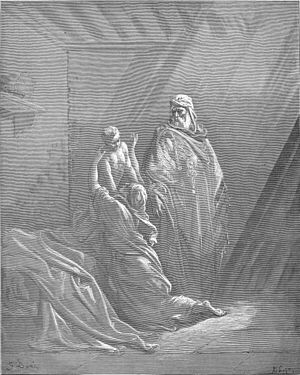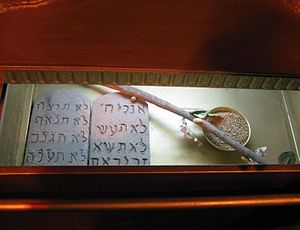Isaiah 55:11 "So is my Word that goes out from my mouth; It will not return to me empty, but it will accomplish what I desire and achieve the purpose for which it was sent."
God’s Word does not return to Him empty. Throughout the Bible, God spoke through men oftentimes making proclamations about the future. As humans, we have an ordinary grasp of time – we know the past from which we have emerged and we have a handle on the present that we experience. But, for humans the future is always uncertain. Though we make plans, there is no guarantee that our plans will come to anything.
God, however, who created all that is – space, matter, and time – is Lord over all; Sovereign over everything. Since God created time, He is Lord over time. God knows the future as well as He knows the past. God imparted knowledge of the future to select individuals who were called prophets. In these chapters in 2 Kings, we read how God’s Word, spoken through prophets, was fulfilled.
God’s Word does not return to Him empty. Throughout the Bible, God spoke through men oftentimes making proclamations about the future. As humans, we have an ordinary grasp of time – we know the past from which we have emerged and we have a handle on the present that we experience. But, for humans the future is always uncertain. Though we make plans, there is no guarantee that our plans will come to anything.
God, however, who created all that is – space, matter, and time – is Lord over all; Sovereign over everything. Since God created time, He is Lord over time. God knows the future as well as He knows the past. God imparted knowledge of the future to select individuals who were called prophets. In these chapters in 2 Kings, we read how God’s Word, spoken through prophets, was fulfilled.
While Elisha was en route to Damascus to anoint Hazael as King of Aram, which was an assignment initially given to his predecessor Elijah, Hazael, sent by Ben-Hadad, King of Aram was on his way to meet Elisha. Though Elisha did not actually anoint Hazael as King, he told him that he would succeed Ben-Hadad and that he would commit atrocities against Israel. The very next day, Hazael assassinated the King of Aram and seized the throne. During the course of his reign, Hazael waged war against Israel greatly reducing Israel’s territory.
Several years earlier, God told Elijah to annoint of Jehu, יֵהוּא , son of Nimshi, whose name means “Jehovah is He” as King of Israel. However, because Elijah was caught up to heaven in a whirlwind with chariots of fire before he could anoint Jehu, this assignment fell upon Elisha who delegated another prophet to actually anoint Jehu.
Under Ahab's rule, Israel was a country hostile to the God of Abraham, Isaac, and Jacob. Ba-al worship was endorsed and supported by the monarchy. Though people remembered the God that Moses taught, their allegiance to God was wavering. Jehu, a prominent military man who was known to King Ahab, was consorting with fellow officers when a prophet sent by Elisha, publicly called him aside. After anointing him to be King of Israel, the prophet charged him with God’s Word originally spoken to Elijah regarding the house of Ahab. Jehu was told to carry out the disaster God vowed to bring upon the house of Ahab. (1 Kings 21) All of this occurred hastily and without fanfare.
In accepting kingship over Israel, Jehu also embraced God’s Will. It would seem that, in his heart, Jehu was prepared to hear and respond to God’s call. The reading of these chapters, shows that he was already familiar with God's judgment on Ahab. When his fellow officers learned what had transpired, they immediately recognized him as king and rallied behind him.
In accepting kingship over Israel, Jehu also embraced God’s Will. It would seem that, in his heart, Jehu was prepared to hear and respond to God’s call. The reading of these chapters, shows that he was already familiar with God's judgment on Ahab. When his fellow officers learned what had transpired, they immediately recognized him as king and rallied behind him.
Though several years passed between the time that God proclaimed a judgment against the house of Ahab, though disbelieving people were probably lulled into ignoring God’s Word, God set about bringing His Words to fruition. As soon as Jehu was anointed King of Israel, he, with his extensive following, set about fulfilling God's Word. Ultimately, as God had stated in 1 Kings 21:21, every male, slave or free, from the house of Ahab was slain.
During the reign of Jehu, whose very name bore witness to the absolute reality of Jehovah, the God of Israel, all of God's judgments against the godless monarchy of Israel were fulfilled.
Elijah prophesied against Jezebel, the wife of King Ahab, who urged Ahab into deeper Ba-al worship and greater godlessness, in 1 Kings 21:24 when he said that dogs will devour her by wall of Jezreel. As it turned out, she was flung from her balcony. Then, shortly afterwards, a pack of dogs attacked her body devouring everything except for her skull, hands and feet (2 Kings 9: 34 - 36). God's Word was fulfilled because He did not intend for her to have a dignified, royal funeral.
During his reign of twenty-eight years, Jehu, King of Israel, unlike other the kings of Israel,
stood for God. God used him to fulfill His Word and to stand as a beacon, bringing back the knowledge of God, the Creator and king of the Universe, to a wayward nation.
It's a curious and interesting aspect of God's witness of Himself that He used fulfilled prophecy to bring Jehu and his subjects, Israel, into a relationship with Him. Because Jehu was familiar with prophecy spoken against the house of Ahab, he understood that God was acting to bring about His Word. Similarly, today, God continues to use fulfilled prophecy to bring the world into a relationship with Him. Fulfilled prophecy always testifies of the One who made the prophecy and of the One who orchestrated its fulfillment.
Though our Bible is historical it is also largely prophetic. While much has been fulfilled, there is still a significant amount awaiting fulfillment. Those who will see the remaining fulfillment of God's Word will be able to fall to their knees and proclaim that the God of Abraham, Isaac, and Jacob, Creator of the Heavens and the Earth, is indeed King of the Universe, Sovereign over all.
During the reign of Jehu, whose very name bore witness to the absolute reality of Jehovah, the God of Israel, all of God's judgments against the godless monarchy of Israel were fulfilled.
Elijah prophesied against Jezebel, the wife of King Ahab, who urged Ahab into deeper Ba-al worship and greater godlessness, in 1 Kings 21:24 when he said that dogs will devour her by wall of Jezreel. As it turned out, she was flung from her balcony. Then, shortly afterwards, a pack of dogs attacked her body devouring everything except for her skull, hands and feet (2 Kings 9: 34 - 36). God's Word was fulfilled because He did not intend for her to have a dignified, royal funeral.
During his reign of twenty-eight years, Jehu, King of Israel, unlike other the kings of Israel,
stood for God. God used him to fulfill His Word and to stand as a beacon, bringing back the knowledge of God, the Creator and king of the Universe, to a wayward nation.
It's a curious and interesting aspect of God's witness of Himself that He used fulfilled prophecy to bring Jehu and his subjects, Israel, into a relationship with Him. Because Jehu was familiar with prophecy spoken against the house of Ahab, he understood that God was acting to bring about His Word. Similarly, today, God continues to use fulfilled prophecy to bring the world into a relationship with Him. Fulfilled prophecy always testifies of the One who made the prophecy and of the One who orchestrated its fulfillment.
Though our Bible is historical it is also largely prophetic. While much has been fulfilled, there is still a significant amount awaiting fulfillment. Those who will see the remaining fulfillment of God's Word will be able to fall to their knees and proclaim that the God of Abraham, Isaac, and Jacob, Creator of the Heavens and the Earth, is indeed King of the Universe, Sovereign over all.



















